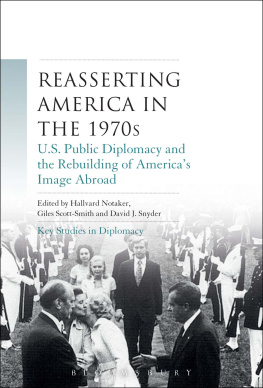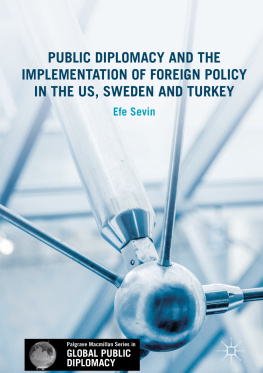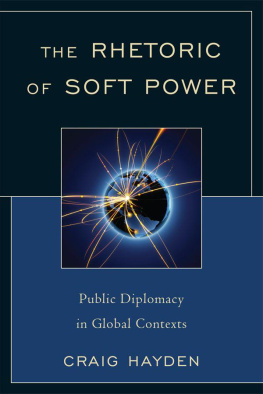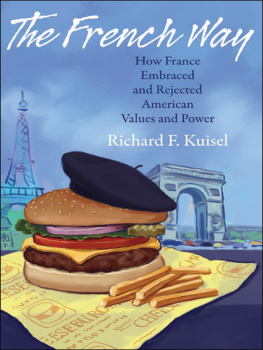Remaking France
Explorations in Culture and International History
General Editors: Jessica C.E. Gienow-Hecht and Frank Schumacher
Volume 1
Culture and International History
Edited by Jessica C.E. Gienow-Hecht and Frank Schumacher
Volume 2
Remaking France
Brian Angus McKenzie
R EMAKING F RANCE
Americanization, Public Diplomacy,
and the Marshall Plan
Brian Angus McKenzie
First published in 2005 by
Berghahn Books
www.berghahnbooks.com
2005, 2008 Brian Angus McKenzie
First paperback edition published in 2008
First ebook edition published in 2014
All rights reserved. Except for the quotation of short passages for the purposes of criticism and review, no part of this book may be reproduced in any form or by any means, electronic or mechanical, including photocopying, recording, or any information storage and retrieval system now known or to be invented, without written permission of the publisher.
Library of Congress Cataloging-in-Publication Data
McKenzie, Brian Angus, 1970
/ Brian Angus McKenzie.
p. cm.(Explorations in culture and international history series; 2)
Includes bibliographical references and index.
7
ISBN 978-1-84545-154-7 (hbk) -- ISBN 978-1-84545-415-9 (pbk) -- ISBN 978-0-85745-561-1 (ebk)
1. United StatesForeign relationsFrance. 2. FranceForeign relationsUnited States. 3. United StatesForeign relations19451953. 4. AmericanizationHistory20th century. 5. Marshall Plan. 6. United StatesForeign public opinion, French. 7. Public opinionFrance History20th century. I. Title. II. Series.
E183.8.F8M38 2005
327.7304'09'044dc22 2005049340
British Library Cataloguing in Publication Data
A catalogue record for this book is available from the British Library
ISBN 978-1-84545-154-7 hardback
ISBN 978-1-84545-415-9 paperback
ISBN 978-0-85745-561-1 ebook
For Rae Ellen McKenzie and
in memory of Richard Angus McKenzieC ONTENTS
L IST OF T ABLES AND F IGURES
L IST OF A BBREVIATIONS
AFAA | Association franaise daction artistique |
AFL | American Federation of Labor |
CAB | Civil Aeronautics Board |
CFTC | Confdration franaise des travailleurs chrtiens |
CGA | Confdration gnrale de lagriculture |
CGT | Confdration gnrale du travail |
CIO | Congress of Industrial Organizations |
CNC | Centre national du cinma |
CNPF | Conseil national du patronat franais |
CRS | Compagnies rpublicaines de scurit |
ECA | Economic Cooperation Administration |
EDC | European Defense Community |
ERP | European Recovery Program |
FO | Force ouvrire |
IATA | International Air Transport Association |
NATO | North Atlantic Treaty Organization |
OEEC | Organization for European Economic Cooperation |
OSR | Office of the Special Representative |
PAO | Public affairs officer |
PCF | Parti communiste franais |
TA | Technical Assistance |
USIA | United States Information Agency |
USIS | United States Information Service |
VOA | Voice of America |
A CKNOWLEDGEMENTS
I am grateful for the support I received while completing this book. At Colby-Sawyer College I benefited from the encouragement of Judy Muyskens as well as from faculty research funds, which allowed me to spend valuable time in France during the final stages of the project. A grant from the American Foreign Policy Center at Louisiana Tech University enabled me to deepen my treatment of the U.S. side of the project. I relied on the assistance of many archivists but David Pfieffer was especially helpful at the National Archives and Records Administration.
I am humbled by and grateful for the advice, criticism, and encouragement I received from colleagues. I hope they will recognize their influences in the pages that follow as much as I do. Judy Stones course on the French Revolution at Western Michigan University is the reason I became interested in French history in the first place. Richard F. Kuisel taught me the historians craft patiently and thoroughly. His mentoring has served as a model and inspiration for my own teaching and his work continues to inspire me. Herman Lebovics, Ellen Furlough, and Michael Barnhart provided important suggestions and I am fortunate to have had the help of these outstanding historians. Brian Etheridges comments on the theoretical aspects of my work were invaluable. Jessica Gienow-Hecht and Frank Schumacher also deserve praise. Their leadership has encouraged and enabled young historians to pursue an exciting agenda for the study of culture and international history. I am grateful for Marion Berghahns support of this agenda. I also wish to thank Michael Dempsey at Berghahn Books for guiding me through the publishing process and Catherine Kirby for her copyediting.
Friends and family made life possible while I was working on this book. My brothers Dennis and Bruce provided joyful respites. Roy Roberts, Peter White, Joel Vessels, Hilary Aquino, Chad Wager, and Greg Barnes provided encouragement when I needed it and essential discouragement on occasion. My parents supported me under the most difficult of circumstances and I hope this book honors their sacrifices. I must also acknowledge the support I received from my family in Old Europe: Marie and Tony Cullen, and Maisy Kelly. My biggest debt is to Pauline Cullen. Her love, patience, and care made this work possible.
I NTRODUCTION
The American empire is intangible, invulnerable, an influence over the minds and customs of mankind which is confirmed every time the world installs an adding-machine, dances to jazz, buys a bale of cotton, sells a pound of rubber, or borrows an American dollar.
John Carter, Conquest: Americas Painless Imperialism, 1928
In 1951 Pariss only baseball diamond was located in the Bois de Boulogne, the expansive park outside the city. According to William Koren, a United States Information Service (USIS) official, the field was in poor condition: there was no dugout and the backstop was a sieve. In short, baseball promoted American values. There were other benefits to promoting baseball in Europe. According to Koren, it could also promote European unity. As an American sport baseball transcended local European culture. Americas national sport offered a potentially unifying pursuit for Western Europe.










